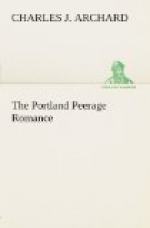His sisters seldom visited him, although one of them, Lady Ossington, lived at Ossington Hall, about 15 miles away, in the same county as Welbeck.
The gossips of his lifetime would have it that his pet aversions were tobacco, women, and anyone in the garb of a gentleman; but he had a taste for drinking stout and lived on a simple dietary.
These stories involve a tissue of inconsistencies. His correspondence with Fanny Kemble when he was Marquis of Titchfield, already quoted, shows his kind consideration, not only for her, but for other ladies who moved in higher circles. There was his friendship with Lady Cork, who was often seen by the workmen on the estate driving Shetland ponies. She was a visitor at Cuckney Hall, which was part of the Welbeck domain. Again there are instances on record of his courtesy to those of the opposite sex whom he met in the park; besides which there were many female servants engaged at the Abbey.
“Music hath charms to soothe the savage breast”; but among the other idiosyncrasies laid to his charge, it was said that rather than soothe, it irritated him.
Mrs. Hamilton’s testimony is that Mr. Druce (assuming him to have been identical with the Duke) was extremely fond of music, and that she had played to him for hours at a time.
“Sing me the old songs, Stuart” Druce would say to her father, who not only sang, but played the violin.
Moreover the workmen at Welbeck were allowed to have a band which performed at the Abbey on Christmas-eve and the bandsmen were given refreshments.
What a quaint figure the Duke’s was. When away from home he wore a wig, but not indoors, his tall hat had a broad brim, he wore a white tie and high collar, his trousers tied round his legs, were of check, with a frock coat and dark waistcoat.
His habits were fastidious, and he would not handle bronze or silver coins before they had been washed. Then he forbade persons to touch their hats to him if they met him.
His manner of dispensing benefactions was characteristic. Sometimes he was lavish in his generosity, while on other occasions he replied in burning words to those who appealed to him.
An instance of the latter is afforded in his reply to the members of a Friendly Society which was in straits for the want of 10l. He told them that if it was a Club established on sound lines, it would be worth their while to subscribe the money among themselves, and if not, he declined to maintain a bankrupt organisation.
He was a devourer of the contents of newspapers, and took all the principal London and provincial daily issues, as well as many weekly journals, which were filed and bound. His bill for one year came to 1,300l. He had four sets of the papers he thought worth preserving, one being at Welbeck, another at Fullarton House, a third at Bothal Castle, and a fourth at Harcourt House. This collection of current literature of the day is believed to be the largest private library outside the British Museum.




